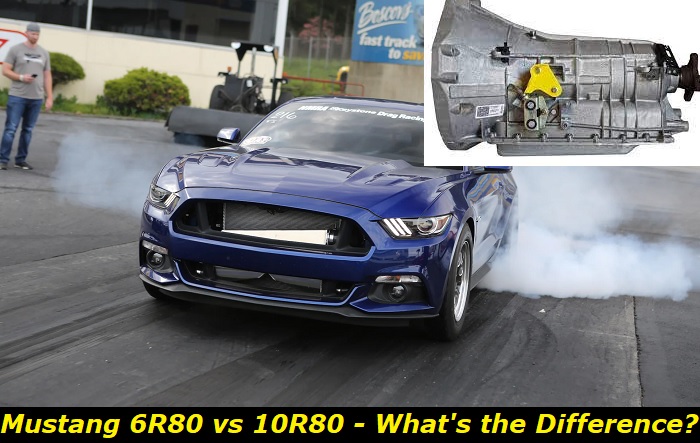When it comes to cars, a lot of focus is placed on the engine. This makes sense because the engine generates the power the car needs, but that power has to reach the wheels somehow. Enter the transmission. The transmission can make or break how a car runs, feels, and handles. If you're serious about performance and your driving experience, then you can't afford to overlook your transmission.
6R80 transmission highlights
- Average lifespan:190,000-210,000 miles
- Reliability Score:High
- Prone to minor issues:Sometimes
- Price for repair after failure:$1,000-$1,500
- Price for replacement:$3,500-$5,000
- Availability of parts:Average
- Common problems: Control module problems, overheating problems, several sensors problems, fast fluid contamination.
10R80 transmission highlights
- Average lifespan:140,000-160,000 miles
- Reliability Score:Low
- Prone to minor issues:Yes
- Price for repair after failure:$1,300-$1,600
- Price for replacement:$5,500-$6,800
- Availability of parts:Average
- Common problems: Glitchy work, software problems, valve body problems, a lot of minor issues, unstable operation.

Review
Both transmissions have received generally positive feedback from Mustang owners. Both transmissions are known for having smooth, responsive shifting.
They are generally considered good options with excellent performance and reliability.
Let's take a deeper look at both options to see what they offer.
Mustang 6R80
The 6R80 is a six-speed automatic transmission that was included in Ford Mustangs from 2011-2017. It is a six-speed automatic transmission that is designed for rear-wheel drive vehicles.
The 6R80 was a popular transmission option that has been considered reliable for a long time. It offers six forward speeds and a robust transmission that can handle up to 1000 horsepower.
The six gears provide a wider gear than its four-speed predecessors, giving it a smoother shift and good fuel efficiency.
It is a compact transmission that is not much larger or heavier than the previous four-speed automatic transmissions like the 4R70W.
The 6R80 is a powerful transmission that lasts a long time if it is not driven too aggressively and has a frequent supply of clean transmission fluid.
While it is generally a reliable option when treated with care, some owners have reported harsh shifting and overheating.
- Performance
The 6R80 is a reliable transmission that handles power well, tolerating up to 1000 horsepower. It has a light clutch and shifts reasonably well.
- Reliability
The 6R80 is a very reliable transmission. After many years of use in Ford vehicles, the transmission has been updated several times to address issues and complaints. This has resulted in a dependable, time-tested transmission.
The 6R80 requires clean transmission fluid and may shift roughly if the fluid is too dirty. It may also develop faults if the car is driven too aggressively, especially at high RPM.
- Features
An important feature in this transmission is the paddle shifters. If you prefer shifting gears yourself, you have the option of shifting with the paddles on the steering wheel. However, the paddle shifters that come with the 6R80 Mustang don't shift very smoothly.
- Common Issues
While it normally has smooth shifting, in some situations the shifting is jerky. This is especially common when the transmission fluid is no longer clean.
The transmission also starts to develop problems when it is used too often at high RPM, which makes it less suitable for racing purposes.
Mustang 10R80
The 10R80 is a single-clutch automatic ten-speed transmission designed for rear-wheel drive vehicles. It is the current ten-speed transmission option for Mustangs and is offered in Mustang models from 2018 to the present. It offers nine forward speeds.
Despite being used in Ford vehicles, the transmission is the result of a collaboration between Ford and GM. The shift to a ten-speed transmission was the result of an attempt to increase fuel efficiency even when using a more powerful engine.
The ten-speed succeeds at getting slightly better fuel efficiency, but it really excels at precise shifting. With ten speeds, the gears are close, which allows the transmission to shift easily and quickly through gears without interruption. This smooth shifting makes the 10R80 considered one of the best ten-speed transmissions available.
Some issues that have been reported with this transmission are rough shifting and hesitation.
- Performance
Because of the high number of gears, the 10R80 has more aggressive shifting. Despite this, the shifting is very smooth and feels almost seamless.
The high number of gears is aimed at increasing fuel efficiency, especially at lower RPM. It is also aimed at improving the power output from the engine.
The ten-speed Mustang accelerates quickly, going from 0-60mph in 3.9 seconds.
- Reliability
Much like the 6R80, the 10R80 is considered a reliable transmission. It doesn't run into many problems, especially when maintained well. Unlike the 6R80, it holds up better to more aggressive driving.
It addresses the overheating problem of its predecessor through an internal thermal bypass that monitors and regulates its internal operating temperature.
- Features
Much like the 6R80, the Mustang 10R80 allows you to take manual control of shifting with the paddle shifters. While it isn't as smooth as the automatic transmission shifting, the paddle shifters have a very smooth shifting response.
- Common Issues
Although this transmission has smooth, precise shifting, in some situations the transmission is rough or uncertain, especially when the adaptive transmission is still learning your driving habits. This issue resolves itself over time as the car learns to adapt to your driving style.
The transmission sometimes has occasional harsh downshifts. In some cases, harsh downshifting is very frequent, which is typically the result of a software glitch. It can be fixed by taking the vehicle to a mechanic or dealership to have the transmission reprogrammed.
On some occasions, the transmission will clunk or hesitate when shifting between drive and reverse. This happens occasionally, but a common issue is when this becomes a frequent occurrence. Taking the vehicle to a dealership or mechanic to reset the transmission is usually enough to fix this.
Differences
As we've seen already, both options are excellent transmissions overall. However, they differ in some key ways.
Let's go into the differences in more detail and compare the strengths and weaknesses of both transmissions.
1) Performance
The most important aspect of the transmission to most drivers is how well it performs. Mustangs are prized for their performance and are considered good track cars.
Whether you want to dominate the track, or you just want to push out as much power as you can on the highway, it's vital to know the performance differences between the 10R80 and the 6R80.
The ten-speed transmission is very effective at maximizing the efficiency of the engine. The 10R80 puts out a noticeable amount of power more than the 6R80. This transmission generally goes from 0-60 mph in a second less than the 6R80 would take with the same engine.
Due to the lower number of gears, the 6R80 shifts less aggressively than the 10R80. While both transmissions shift smoothly, the ten-speed has a much smoother, almost seamless, shift than the six-speed.
2) Reliability
Both the 6R80 and the 10R80 are reliable options. They both shift smoothly and rarely experience harsh shifting.
Some consider the 6R80 to be more reliable, as it has been out for longer and Ford has had the time to work out the problems with the transmission.
However, the 6R80 transmission starts to run into problems rather quickly if it's constantly used at high RPM. The 10R80 on the other hand is solidly built and can withstand more spirited driving.
The 10r80 is generally considered more reliable, and able to withstand high-power engines and high RPM for much longer than the 6R80. It also has technology built in to address some of the issues experienced by the 6R80. An example of this is the internal thermal bypass that monitors the operating temperature to prevent overheating.
3) Fuel Efficiency
One of the objectives of a 10-speed transmission is to maximize the fuel economy of an engine. The 10R80 manages to get slightly better fuel economy than the 6R80 while putting out more power.
4) Features
Both options come with paddle shifters to allow the driver to take manual control of the gears. Neither option has paddle shifting that is as smooth as the transmission's automatic shifting. However, the paddle shifters on the 10R80 are much more responsive than those on the 6R80
5) Common Issues
While both transmissions have their strengths, they also have some issues that you need to be aware of to make an informed choice.
Both transmissions occasionally make difficult downshifts. They also both require clean transmission fluid. They are liable to very rough shifting when the transmission fluid is dirty.
The 6R80 is prone to overheating. This is an issue the 10R80 has addressed using an internal thermal bypass.
Despite the superior shifting of the 10R80, it often hesitates when shifting between drive and reverse.
Final Verdict
Performance-wise, the ten-speed is a better transmission in almost every way. It accelerates faster and gets more power from the engine to the asphalt. The different modes available also help you achieve optimal performance in both street driving and race-track scenarios.
The 10R80 also provides a very smooth shift that outdoes the 6R80. The 10R80 is also more reliable, with engineering specifically aimed at addressing some problems from the 6R80 to make it more durable and long-lasting.
Generally, the strengths of the 10R80 shine on a racetrack. If you need a car that can accelerate quickly, shift smoothly, and put out a considerable amount of power, then the Mustang 10R80 is the right choice.
About the authors
The CarAraC research team is composed of seasoned auto mechanics and automotive industry professionals, including individuals with advanced degrees and certifications in their field. Our team members boast prestigious credentials, reflecting their extensive knowledge and skills. These qualifications include: IMI: Institute of the Motor Industry, ASE-Certified Master Automobile Technicians; Coventry University, Graduate of MA in Automotive Journalism; Politecnico di Torino, Italy, MS Automotive Engineering; Ss. Cyril and Methodius University in Skopje, Mechanical University in Skopje; TOC Automotive College; DHA Suffa University, Department of Mechanical Engineering






Add comment